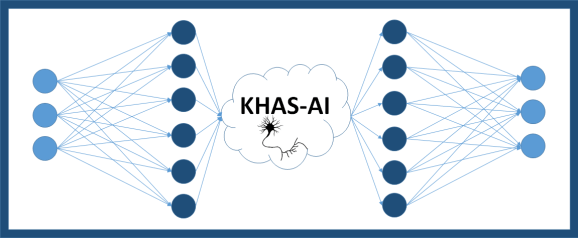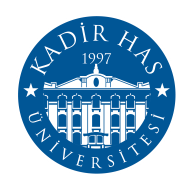PUBLICATIONS
BOOK
• Sina Balkır, Günhan Dündar, A. Selçuk Öğrenci, Analog VLSI Design Automation, CRC Press, June 2003.
JOURNAL PAPERS
• İ. Bayraktaroğlu, A.S. Öğrenci, G. Dündar, S. Balkır, E. Alpaydın, "ANNSyS:An Analog Neural Network Synthesis System", Neural Networks, pp. February, 1999. (SCI)
• A.S. Öğrenci, G. Dündar, S. Balkır, “Fault Tolerant Training of Neural Networks in the Presense of MOS Transistor Mismatches,” IEEE Transactions on Circuits and Systems-II: Analog and Digital Signal Processing, Vol.:48, No:3, pp. 272-281, March 2001. (SCI)
• A.H. Bilge, O. Pekcan, S. Kara, A.S. Ogrenci, “Epidemic models for phase transitions: application to a physical gel,” Phase Transitions, Vol.:90, No:9, pp. 905-913 http://dx.doi.org/10.1080/01411594.2017.1286487, 2017. (SCI)
• A. S. Ogrenci, T. Arsan, “Transmitter source location estimation using crowd data,” Computers & Electrical Engineering, ISSN0045-7906, Vo.;66, No:2, pp. 127-138, https://doi.org/10.1016/j.compeleceng.2017.09.026, 2018. (SCI-Exp)
• A.S. Ogrenci, O. Pekcan, S. Kara, A.H. Bilge, “Mathematical Characterization of Thermo-reversible Phase Transitions of Agarose Gels,” Journal of Macromolecular Science, Part B, Vol:57, No:5, pp. 364-376, DOI:10.1080/00222348.2018.1463052, 2018. (SCI-Exp)
• A.H. Bilge, A.S. Ogrenci, O. Pekcan, “Mathematical Models For Phase Transitions In Biogels,” Modern Physics Letters B, DOI: 10.1142/S0217984919501112 , 15.3.2019, 2019. (SCI)
• Y. Karadayi, M. N. Aydin, A. S. Ogrenci, “A Hybrid Deep Learning Framework for Unsupervised Anomaly Detection in Multivariate Spatio-Temporal Data,” Applied Sciences, 2020, 10(15), 5191, https://doi.org/10.3390/app10155191, 2020. (SCI-Exp, Q1)
• Y. Karadayi, M. N. Aydin, A. S. Ogrenci, “Unsupervised Anomaly Detection in Multivariate Spatio-Temporal Data Using Deep Learning: Early Detection of COVID-19 Outbreak in Italy,” IEEE Access, vol. 8, pp. 164155-164177, doi: 10.1109/ACCESS.2020.3022366, 2020. (SCI-Exp, Q1)
• Gilik, A., Ogrenci, A.S. & Ozmen, A. Air quality prediction using CNN+LSTM-based hybrid deep learning architecture, Environmental Science and Pollution Research, 29, 11920–11938, 2022. (SCI-Exp, Q2)
• A. S. Ogrenci, A. H. Bilge, O. Pekcan & M. Incegul, “Epidemic Models for Chemical Gel Phase Transformation: Effect of Optical Measurements with Different Wavelengths,” Journal of Macromolecular Science, Part B, doi:10.1080/00222348.2023.2203556, 2023. (SCI-Exp)
CONFERENCE PAPERS
• A.S. Öğrenci, S. Balkır, "Bezier function based waveform relaxation techniques for the simulation of MOS VLSI circuits," ESS'95: European Simulation Symposium, Erlangen, Germany, 1995.
• A.S. Öğrenci, G. Dündar, "SAFANN (Silicon Assembler For Analog Neural Networks)," TAINN'96: Turkish Artificial Intelligence and Neural Networks Symposium, Istanbul, Turkey, 1996.
• İ. Bayraktaroğlu, A.S. Öğrenci, G. Dündar, S. Balkır, E. Alpaydın, "On-Chip Training by Software for Analog Neural Networks Using ANNSyS," 6th NASA Symposium on VLSI Design, pp. 910-915, Albuquerque, USA, 1997. DOI: 10.1109/ICNN.1997.616146
• A.S. Öğrenci, G. Dündar, S. Balkır, E. Alpaydın, "Training of Multilayer Artificial Neural Networks with Nonlinear Multipliers in Analog Integrated Circuits,” SIU'97: Sinyal İşleme ve Uygulamaları Konferansı, Kuşadası, Turkey, 1997. (in Turkish)
• I.G. Erten, A.S. Öğrenci, G. Dündar, "A Compaction Algorithm for SAFANN," Proceedings of the 6th Turkish Symposium on Artificial Intelligence and Neural Networks (TAINN'97), pp. 311-316, Ankara, Turkey, 1997.
• İ. Bayraktaroğlu, A.S. Öğrenci, G. Dündar, S. Balkır, E. Alpaydın, "ANNSyS (An Analog Neural Network Synthesis System", ICNN'97: IEEE International Conference on Neural Networks, Houston, USA, 1997.
• A.S. Öğrenci, M.R. Becer, G. Dündar, S. Balkır, "Incorporating MOS Transistor Mismatches into Training of Analog Neural Networks", NC'98: ICSC/IFAC Symposium on Neural Computation, Vienna, Austria, 1998.
• G. Coşgül, A. S. Öğrenci, G. Dündar, "Neural Network Based CAD Tool for Modeling Manufacturing Variations in MOS Devices," Proceedings of the 8th Turkish Symposium on Artificial Intelligence and Neural Networks (TAINN'99), pp. 202-209, Istanbul, Turkey, 1999.
• İ. C. Çevikbaş, A.S. Öğrenci, G. Dündar, S. Balkır, “VLSI Implementation of GRBF (Gaussian Radial Basis Function) Networks,” ISCAS’2000 International Symposium on Circuits and Systems, Geneve, Switzerland, May 2000. DOI: 10.1109/ISCAS.2000.856143
• D. Albuz, A.S. Öğrenci, G. Dündar, "Using Sensitivity Analysis for Weight Quantization," Proceedings of the 9th Turkish Symposium on Artificial Intelligence and Neural Networks (TAINN'2000), pp. 127-136, Izmir, Turkey, 2000.
• E. Karakuş, A.S. Öğrenci, G. Dündar, "Parameter Quantization Effects in Gaussian Potential Function Neural Networks,” NNA2001 (2001 WSES International Conference on Neural Networks and Applications), Puerto de la Cruz, Spain, February 2001.
• T. Arsan, A.S. Öğrenci, İ.A. Yılmaz, “Kadir Has University Oracle Academic Initiative,” AB’2001: Akademik Bilişim 2001, Samsun, Turkey, 1-2 February 2001. (in Turkish)
• A.S. Öğrenci, “System Level Requirements for Molecular Computing Architectures in Realizing Information Processing Systems”, NATO-ASI, Molecular Electronics: Bio-sensor and Bio-computer, Pisa, Italy, 24 June - 4 July 2002.
• A. Bürümcek, A.S. Öğrenci, “Analysis of Square Root Function Design and Optimization in FPGAs,” DSD2003 (EUROMICRO Symposium On Digital System Design), Antalya, Turkey, 1-6 Sept. 2003.
• A.S. Öğrenci, T. Arsan, T. Saydam, “An Open Software Architecture of Neural Networks: NeuroSoft,” SEA2004 (IASTED Conference on Software Engineering and Applications), Boston, USA, 9-11 Nov. 2004.
• T. Arsan, A.S. Öğrenci, T. Saydam, “A Systems Software Architecture For Training Neural, Fuzzy Neural And Genetic Computational Intelligent Networks,” WCCI2006 (World Congress on Computational Intelligence, 2006 International Joint Conference on Neural Networks), pp. 5275-5280, Vancouver, Canada, 16-21 July 2006. DOI: 10.1109/IJCNN.2006.247282
• A.S. Öğrenci, “Abstraction in FPGA Implementation of Neural Networks,” The 9th WSEAS International Conference on NEURAL NETWORKS (NN'08), Sofia, Bulgaria, May 2-4, 2008.
• A.S. Öğrenci, “Empirical results about efforts for effective teaching to y-generation freshman students,” 11th International Conference on Information Technology Based Higher Education and Training (ITHET 2012), Istanbul, Turkey, 2012. DOI: 10.1109/ITHET.2012.6246043
• A.S. Öğrenci, “Complex event post processing for traffic accidents,” 13th IEEE International Symposium on Computational Intelligence and Informatics (CINTI 2012), pp. 341-345, Budapest, Hungary, 2012. DOI: 10.1109/CINTI.2012.6496787
• A.S. Öğrenci, “Why do students prefer search engines over academic databases,” 12th International Conference on Information Technology Based Higher Education and Training (ITHET 2013), pp. 1-3, Antalya, Turkey, 2013. DOI: 10.1109/ITHET.2013.6671054
• A.S. Öğrenci, “Collaborative Peer Assessment in a Blended Learning Environment,” Immersive Education Europe Summit (iEDE 2013), London, UK, 2013.
• A.S. Öğrenci, Z. Erol “Disease Information System Based on Web Services,” 2014 7th International Conference on Computer Science and Information Technology (ICCSIT 2014), Barcelona, Spain, 2014.
• A. S. Öğrenci, “How to Prevent Students Falling Down in a Flipped Classroom,” The Future of Education, Florence, Italy, 2015.
• A. Yesilkaya, O. Karatalay, A.S. Ogrenci and E. Panayirci “Channel Estimation for Visible Light Communications Using Neural Networks,” WCCI2016: IEEE World Congress on Computational Intelligence, pp. 320-325, Vancouver, 2016. 2016 International Joint Conference on Neural Networks (IJCNN) DOI: 10.1109/IJCNN.2016.7727215
• J. Dorner, S. Favrichon and A.S. Ogrenci, “Weight Exchange in Distributed Learning,” WCCI2016: IEEE World Congress on Computational Intelligence, pp. 3081-3084, Vancouver, 2016. DOI: 10.1109/IJCNN.2016.7727591
• M. T. Altabba, T. Ayabakan, A. S. Ogrenci, “Fuzzy Logic for Decision Extraction from Product Reviews,” International Conference on Energy, Communication, Data Analytics and Soft Computing (ICECDS 2017), Chennai, India, 1-2.8.2017.
• E. Cay, Y. Mert, A. Bahcetepe, B. K. Akyazı, A. S. Ogrenci, “Beacons for Indoor Positioning,” Int. Conference on Engineering and Technology ICET17, Antalya, 21-23.8.2017
• O. Ulgen, A. S. Ogrenci, “Structured Learning Based Turkish Sentiment Analysis,” ASYU2017 Innovations and Applications in Intelligent Systems, Alanya, 5-7.10.2017.
• A. S. Ogrenci, “Anomaly Detection in Walking Trajectory,” 26. IEEE Sinyal İşleme ve İletişim Uygulamaları Kurultayı (SİU), İzmir, 2-5.5.2018.
• Arif Selçuk ÖĞRENCİ, Atilla ÖZMEN, Batuhan ALBAYRAK, Buket DARICI, Furkan KİRACI, Kerem ERTEZ, “ Sickle Cell Anemia Detection,” TIPTEKNO2018 Konferansı, 8-10.11.2018, Kıbrıs
• Ayşenur Gilik, Batuhan Albayrak, Arif Selçuk Öğrenci, “Clustering of Countries using Computational Models,”INTERNATIONAL CONFERENCE ON THEORETICAL AND APPLIED COMPUTER SCIENCE AND ENGINEERING 2018, 23-24.11.2018, Ankara.
• Mhd Tahssin Altabbaa, Arif Selcuk Ogrenci, Erdal Panayirci, and H. Vincent Poor, “Sparse Channel Estimation for Space-Time Block Coded OFDM-Based Underwater Acoustic Channels,” 2018 IEEE Global Communications Conference (GLOBECOM), UAE, 2018.
• F. K. Mirza, A. S. Ogrenci, “Using Hybrid Approaches for Credit Application Scoring,” 23rd IEEE International Symposium on Computational Intelligence and Informatics (CINTI 2023), pp. 111-116, Budapest, Hungary, 2023. DOI: 10.1109/CINTI59972.2023.10382025

